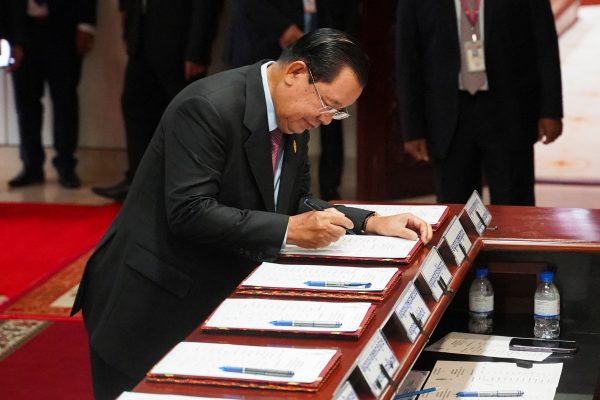The succession plan was accelerated after the watershed 2013 election — the most competitive general election in recent times — when Hun Sen and the ruling Cambodian People’s Party (CPP) received a clear signal that political change was needed to revive the party’s declining support.
The new legitimation strategy that saw the children of party leaders succeeding their fathers as government leaders was expected to offer an invigorating political shakeup that the country’s growing youth population desperately needs after more than 40 years of CPP rule. But the generational change only went ahead after the demise of competitive elections. Hun Manet and his new government’s success in turning Cambodia into an upper-middle-income country by 2030 — a goal set by Hun Sen — can determine if competitive elections could return.
Regime stability, achieved through the ruthless repression and co-optation of political opposition, gave Hun Sen and the CPP the confidence that a transfer of power could finally occur. The CPP was determined to avoid the fate of the United Malays National Organisation (UMNO)–Barisan Nasional (BN) coalition in Malaysia by making sure that there was no equivalent to Pakatan Harapan that would throw them out of office. In 2018, when the UMNO–BN coalition was decisively defeated by Pakatan Harapan, the CPP took all seats in the National Assembly in an election without the dissolved Cambodia National Rescue Party (CNRP).
Cambodia has thus avoided ‘embittered authoritarianism’, a paralysing situation where a regime is not expected to succeed, that political scientists Dan Slater and Joseph Wong think Cambodia has found itself in since 2008. In reality, the regime survives and thrives, and a once-in-a-generation power transition has been sanctioned.
If competitive elections died to pave the way for the leadership change, they may be given a new life in Hun Manet’s Cambodia. It is likely that Western democracies, particularly the United States, will continue to have a role to play in reinstalling competitive elections in Cambodia. But, as it strives to strike a delicate balance between geopolitical competition and democracy promotion, the United States may need to adopt persuasive rather than coercive strategies to nudge Cambodia to roll back its repression of political opposition.
Another possibility, drawing on Slater and Wong’s democracy through strength theory which argues that Asia’s authoritarian regimes concede democracy to preserve power, is Cambodia liberalising on its own terms. This would require the new government to achieve significant developmental success as a pre-condition for liberalisation. Hun Manet’s government will need to deliver results. If Hun Sen’s legitimacy was built on his claims of liberating Cambodia from the Khmer Rouge regime, Hun Manet needs to build his legitimacy on modernising the country with a narrowing wealth gap, rather than mere rosy GDP growth figures, as the barometer.
That might be the only source of legitimacy left for him to attain because he cannot tap into the state-building legitimacy that his father could. By defeating armed resistance waged by remnants of the previous regimes and assimilating the military force loyal to the rival FUNCINPEC party, Hun Sen and the CPP succeeded in monopolising the use of force over Cambodia’s territory by 1998. It was an accomplishment of stateness that had eluded Cambodia for centuries.
Hun Manet has no part in this historical legacy and cannot use it to justify his right to rule. What he can do is demonstrate that the CPP deserves to run the state — not because it built it, but because it can run it better than other parties. Competitive elections might be countenanced when a political opening is needed to renew political legitimacy and Hun Manet and Hun Sen are confident that performance legitimacy would bestow the CPP sufficient strength to compete with the opposition for majority support.
But much would also depend on how enthusiastic Cambodia’s youthful population is in the return of competitive elections. Authoritarian leaders do not just allow competitive elections because they are strong. Pressure for liberalisation will need to come from Cambodia’s young people, who are expected to become more demanding as their living conditions improve. They need to signal that disenfranchising popular opposition parties cannot continue and that the CPP’s legitimacy would be contingent on both the degree of political contestation and the level of economic development that it provides.
Even if competitive elections return, the electoral playing field is likely to remain heavily skewed in favour of the CPP as it was before the dissolution of the CNRP in 2017. The difference is that, if it achieves a high level of economic development, the CPP could deploy performance legitimacy in combination with unfair elections as its new ruling strategy — a strategy that served Malaysia’s UMNO well for four decades, and continues to serve the People’s Action Party in Singapore.
Mun (Mark) Vong is Lecturer in the School of Government and International Relations at Griffith University.

